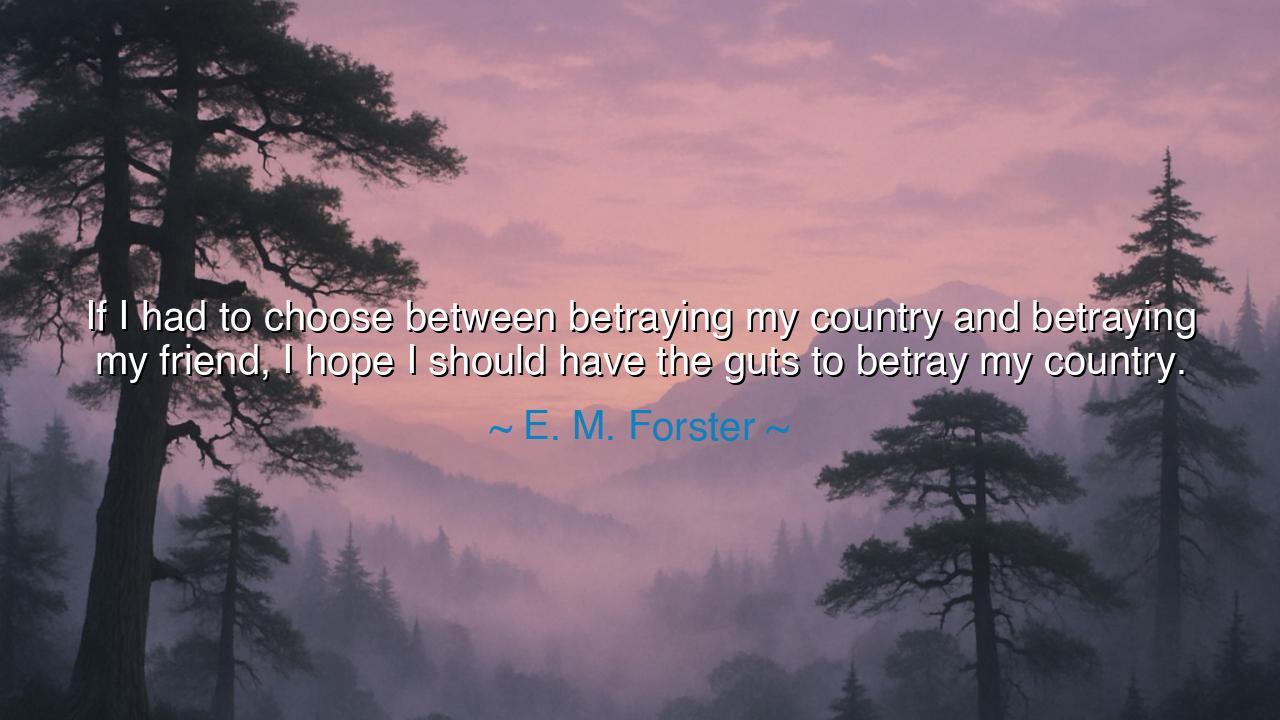
If I had to choose between betraying my country and betraying my
If I had to choose between betraying my country and betraying my friend, I hope I should have the guts to betray my country.






“If I had to choose between betraying my country and betraying my friend, I hope I should have the guts to betray my country.” Thus spoke E. M. Forster, the English novelist whose words struck at the heart of loyalty, morality, and the human spirit. In this declaration—at once shocking and noble—Forster confronts one of the oldest and hardest questions of the soul: what holds the highest claim on our allegiance—the vast and impersonal idea of the nation, or the intimate, living bond of friendship? His answer is daring, even heretical: that the moral duty to love and to remain loyal to the human being before us outweighs blind obedience to flag or state.
Forster lived through an age of great upheaval—two world wars that shook the very foundations of civilization. In such times, men were taught that to love one’s country was the greatest virtue, and to question it was treason. But Forster, a writer of compassion and clarity, saw the danger of nationalism when it severed the individual from his conscience. To betray one’s friend—to cast aside love, trust, and personal integrity for the sake of an abstract political loyalty—was, to him, the true corruption of the spirit. In his view, the state is an institution, a creation of human design, but friendship is sacred, bound by truth and empathy. Thus, when he speaks of choosing, he reminds us that moral courage is often found not in serving the powerful, but in standing with the powerless, even when the cost is exile or shame.
The ancients, too, wrestled with this conflict between duty to the state and duty to the heart. In the Greek tragedy Antigone, the heroine defies the king’s decree to honor her brother with burial, saying, “I was born to love, not to hate.” For this act of familial loyalty, she is condemned to death. Yet her defiance shines across centuries as a beacon of moral strength. Like Forster, Antigone placed human compassion above obedience to authority. Both voices speak of a deeper law—the law of conscience, which transcends borders and governments, and which binds humanity together long before nations ever existed.
History itself offers examples of those who chose friendship and humanity over patriotic command. Consider Oskar Schindler, a German industrialist and member of the Nazi Party, who risked his life to save over a thousand Jews during the Holocaust. In doing so, he betrayed his country’s laws but upheld the eternal law of goodness. Schindler’s loyalty was not to ideology but to humanity. He proved that the noblest act of courage may appear as treason in the eyes of tyrants. In him, as in Forster’s vision, we see that the heart’s allegiance—to mercy, to truth, to friendship—is the highest form of patriotism, for it defends what makes a nation worth loving in the first place.
Forster’s quote also carries a quiet irony: he does not boast that he would betray his country, but that he hopes he would have “the guts” to do so. This humility reveals his awareness that such a choice is no easy one. The courage to act according to conscience often demands immense sacrifice. It is easy to proclaim loyalty to ideals in peace; it is far harder to hold to love in times of war, when fear and fury drown out reason. Forster does not glorify rebellion—he glorifies integrity. His words challenge us to live not as instruments of ideology, but as human beings guided by compassion, empathy, and the quiet bravery of the heart.
The meaning of Forster’s words, then, is not an invitation to anarchy or betrayal, but to moral discernment. He asks us to see that true honor lies not in blind allegiance but in thoughtful loyalty—to humanity, to truth, and to the sanctity of personal bonds. A nation that demands the betrayal of conscience betrays itself. For what is a country, if not a collection of friendships, families, and lives bound together by mutual care? To defend friendship, therefore, is to defend the very soul of civilization.
The lesson, my listener, is both simple and profound: let your loyalty be to love, not to symbols. Serve your country by serving its people, and serve its people by cherishing the humanity within each of them. Do not let pride or politics make you forget the beating heart before you—the friend who shares your laughter, your burdens, your dreams. Be courageous enough to act for what is right, even when the world calls it wrong. For the truest form of patriotism is not obedience, but conscience—not hatred for others, but love for one’s own kind.
And so, remember the daring wisdom of E. M. Forster: “If I had to choose between betraying my country and betraying my friend, I hope I should have the guts to betray my country.” These are not the words of a traitor, but of a sage—one who reminds us that the highest loyalty is to truth, and the greatest nation is the one that teaches its people to be fully human. For when friendship and love are sacred, the world itself becomes stronger, more just, and more free.






AAdministratorAdministrator
Welcome, honored guests. Please leave a comment, we will respond soon